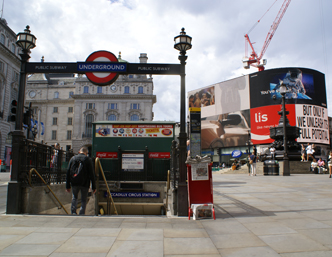Futurescape, billed as ‘a journey through London over the next 100 years’, is the latest imagining of our future. While it’s a sight more optimistic than the grim scenarios of Hollywood movies, nowhere is there any sign of a security industry. But Security will no doubt be around, writes Mark Rowe.
Futurescape London is a free 3D digital model, based on Piccadilly Circus and launched by the Piccadilly-based think tank Chatham House to mark its 100 year anniversary, the Futurescape London ‘experience’ is set in 2035, 2060, 2090 and 2121.
Already by 2035, the Circus looks different; no traffic, above all. We’re told there’s a four-day working week and three-day weekend, thanks to AI and automation.
Drones are delivering parcels, machines are making coffee, public transport is automated and driverless, and robots restock shop shelves. More people work from home and many offices around Piccadilly Circus have been repurposed into new types of social spaces. Local, independent businesses around London’s West End are thriving.
Automation means you can get complex medical tests results in seconds, court decisions in minutes, instant access to public services any time, and schools can now provide personalised learning.
Londoners have more leisure time.
As for 2060, the Circus has not bus stops but stops for water ebuses; London looks like Venice because of canals, due to rising water levels, due to climate change. What’s become of all the cabling under the streets? Buildings, businesses and transport rely completely on renewable energy, solar photovoltaic building materials, and micro wind turbines; streetlights are powered by the footfalls of passing pedestrians thanks to power-generating pavement tiles. Insect protein is a delicacy. Predictions even further into the future are only slightly more freaky such as AI clothes that can change colour, shape and style. Buildings, too, can shape-shift.
The Futurescape looks remarkably relaxed and uncongested, without a sign of the surveillance apparatus that has sprung up in recent decades: CCTV cameras, intruder alarms. And yet in the future according to Futurescape, even more surveillance is implied, if only for location tracking, so that all those delivery drones and taxi-sized drones that drop to the earth and pick up a passenger to take them to a rooftop balcony can do so safely without crashing.
Besides all the objects needing protection from theft (a daylight snatch, or from the depot at night, presumably far from Piccadilly Circus), the AI data – vastly more than even now – will need securing, to make it available at all times (you don’t want your drone taxi falling out of the sky), and to guard against tampering, let alone outright theft.
Then there’s the social behaviour that arises from a piece of tech widely adopted, such as (to give the prime early 21st century example) the mobile phone, which in truth has become a mobile computer. Already we have a scourge of a spectrum of ‘online harms’, from fake news and quack medicines to get-rich-quick scams to identity theft and outright fraud and money laundering; and the tech firms and law enforcers alike have a grip on none of it.
Just as it’s asking a lot of London to physically change to canals and renewable energy due to climate change – as drastic a change as the city has ever had to undergo, on a par with the 19th century railways – so it’s asking a lot for people to keep up with the tech, and to use it safely.
The same crime opportunities will arise. If we are going to have to eat insects by mid-century, there could be food fraud, just as fraudsters profited in the horse meat scandal of 2013, and if criminals label food as organic and charge a higher price when it’s in fact cheaper non-organic food.
Futurescape is one of the two kinds of imagined future – the liberal, green, benign and optimistic kind, whereas so many are the opposite, dark (literally), grim and crime-ridden. One thinks of the Terminator movies, and the 1980s movie Blade Runner (based on a 1960s novel by Philip K Dick) and the most recent sequel, set in 2049. Common to them and to the extraordinary play Mister Burns is some ecological catastrophe, or ‘collapse’, all the more sinister if it’s left unsaid.
Whether you think the future will have much, or any crime, depends on your world-view and why you think people do crime (with exceptions always) – whether because they are bad people and would do it whatever their circumstances, or whether they turn to it as an option to make a living because other opportunities are lacking. It may be significant that often in the grim futures the hero is a crime detective – the Will Smith character in the movie of the Isaac Asimov novel I, Robot; and Dekker in Blade Runner. Green or grim, there will be a place for Security.
Rose Abdollahzadeh, Managing Director of Research Partnerships at Chatham House said: “Work on Futurescape began in January 2020 with the transition to sustainability at the heart of our ambitions, but as the wide-ranging impacts of the pandemic became more apparent, our focus expanded to include physical and mental health, wellbeing, community and culture.
“Everything featured in the Futurescape time periods either already exists, or is in development. In that sense, all of it is highly achievable and plausible if society wants to make it happen. The pandemic has also significantly accelerated certain changes. For example, ‘VR holidays’ which appear in 2060 in Futurescape, are already being rolled out today as a reaction to the restrictions on travel.
“Our aim with Futurescape is to encourage a discussion around driving positive development in our cities. If we can’t imagine a positive future we want, we have no chance of getting there.”
Photo by Mark Rowe; Piccadilly Circus from Regent Street, August 2020.










